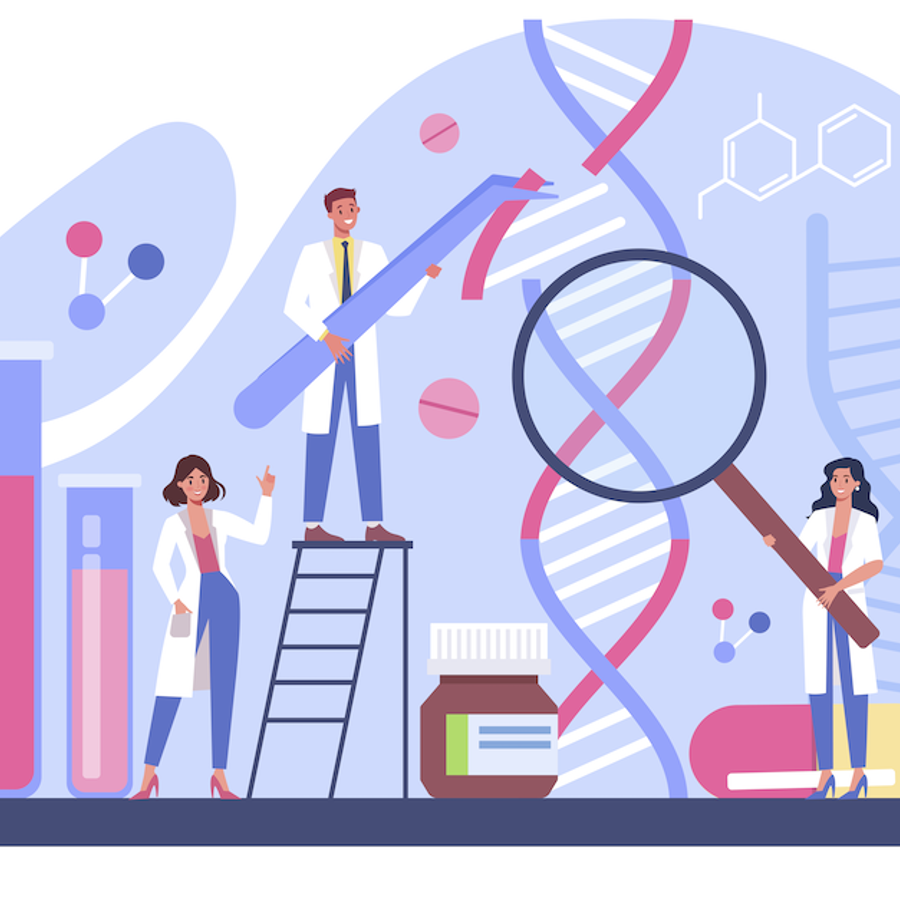
How do I become a geneticist?
June 8, 2024

- Related Topic:
- Career pathways
A middle school student from Colorado asks:
"How do I become a geneticist?"
Given that you are already asking the question, all you really have to do is continue to follow your natural curiosity!
There are a lot of different specialities and career types within genetics. So there are a lot of different ways to identify as a "geneticist"!
Allow yourself to find your own path through science and remember that there isn’t one “correct” way to be a geneticist.
What is a geneticist?
Being a geneticist can mean many different things!
For example, a Medical Geneticist is a specific type of doctor. They go to medical school just like cardiologists, pediatricians, and other types of physicians. They diagnose rare genetic conditions and help patients make healthcare decisions.
Or Genetic Counselors typically get a master’s degree. Then they talk with patients (and doctors!) about their specific genes and how they might impact their health or their family.
Or many Scientists specifically focus on the field of genetics. Scientists may look at DNA for specific changes or differences and figure out what they might mean. This could be by performing experiments with actual DNA or cells, or this could be done on the computer analyzing DNA sequences that are already known.
And scientists don’t just study humans! All living things have genes! You could be a bacterial geneticist, plant geneticist, or any other living thing you can imagine.
However, you don’t have to work in a hospital or laboratory to be a geneticist!
You could choose a path related to forensic science and solving crimes. Maybe you want to be involved in changing government policies based on what we know about genetics. Are you passionate about writing? You could write research papers as a science writer, or work for a publishing company. Maybe you love to draw, do graphic design, or paint? You could commission artwork related to genetics.
The possibilities are endless! If you are passionate about genetics, there is a career related to it that you can pursue.
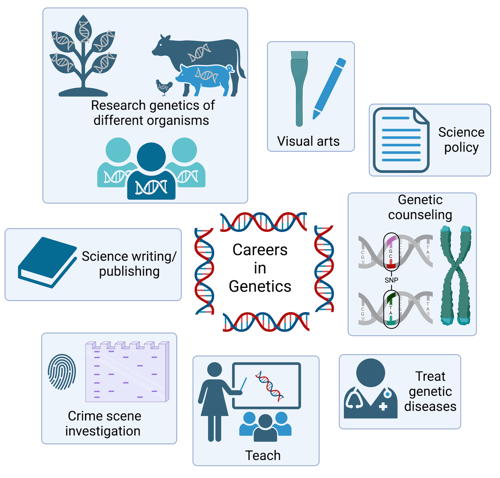
My journey as a genetic scientist
The best part about becoming a geneticist (or really any type of science career) is that every person has their own unique journey. All it really takes to be a geneticist is curiosity (we all have it!) and an interest in pursuing your curious nature.
I became interested in genetics in high school. I was lucky enough for my high school to offer a class where we made bacteria glow green by giving them a specific piece of DNA. This was the first time in my life that science felt accessible to me. Before this class I remember thinking that you had to be some kind of superhuman genius to become a scientist, but this isn’t true at all! The reality is that anyone can do science, but it can feel inaccessible for many people.
Then, when I got to college I took a microbiology class. This class is the reason that I am a geneticist today. We learned that many bacteria live on and in your body, and that there are many more total genes in these bacteria than in the human genome! I became incredibly intrigued by this fact and began to wonder how these genes function and what impacts their functions might have on humans.
My curiosity quickly led me into the lab, where I fell in love with research. I decided to pursue a PhD in genetics.
As a PhD student, I spend a lot of time working in a laboratory! I work with DNA a lot! I sometimes make changes in bacterial DNA and see what happens to the bacteria. I also look at existing bacterial DNA and see how it differs across different bacteria.
I also think about unsolved questions, and what the best way to answer those questions might be. I also read a lot of research papers published by other scientists to learn what is already known. My favorite part of doing research in the lab are the moments when I get to look at data that I have generated, think about what it means, and realize that I am the first person to have ever discovered the answer to a specific question.
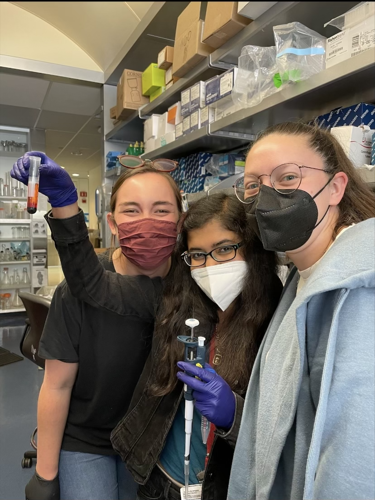
I spend a lot of time talking to other scientists about work and getting their feedback and ideas. I also present my research at scientific conferences to get feedback from wide audiences.
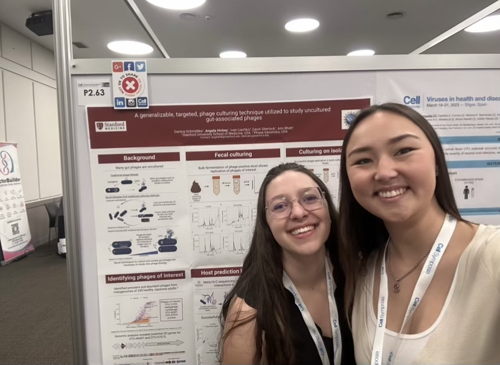
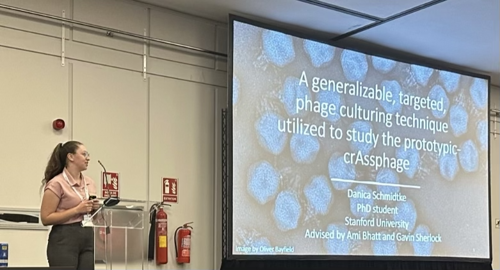
Finally, I do a lot of scientific writing! I write applications to try to get grants or fellowships that would fund the research that I am interested in. I also write scientific papers! It’s important for scientists to share what experiments they do and what answers they discover.
I’ve been a coauthor on several papers alongside other scientists. This is an interesting process that includes what we call “peer review”. That’s where other scientists read the proposed article to make sure it’s accurate and doesn’t have major problems. These reviewers often give very detailed feedback on the draft, which the authors need to address before the article is finally published.
What can you do if you are interested in genetics?
Try out science at home or in a science center!
There are a lot of activities you can do at home with your family! There are many resources online with activity ideas (check out The Tech Interactive at Home. You can also visit science centers that have hands-on activities for visitors to try (come visit the Biotinkering lab at the Tech to do hands-on genetics activities with Stanford scientists like me!). Additionally, you could participate in community science where the general public helps scientists collect data!
Take a science class or apply for a science program!
If you are a student, sign up for a science class! There are also programs that you can apply for that are aimed at students that want to get their feet wet with research! Or see if organizations in your community have science events, classes, and activities for adults.
Try out research in a lab!
If you want to become a scientist, it’s great to get experience in a laboratory! It is common to feel underqualified for research positions, and the process can feel daunting. However, the best way to learn how to do lab work is to do it, and gain hands-on experience! Like many other universities and science nonprofit organizations, Stanford has programs for elementary/middle school students, high school students, and college students to gain their first lab experiences. Also, labs often look for undergraduate research volunteers. So if you are interested in working in a lab you can look up professors at your institution and email them.
Go to/listen to informational events to learn more!
If you are interested in genetic counseling you can attend an outreach event hosted by the Stanford Genetic Counseling Diversity, Equity, Inclusion, Action Outreach Committee (https://sites.google.com/stanford.edu/sgc-dei-aoc/outreach).
Listen to a podcast about topics and careers in genetics!
Get artistic inspiration!
There are some interesting science based art exhibits that you can check out online/in person for inspiration:
- Art Made with Human DNA Explores the Future of Genetics in Birmingham, UK
- Visualizing CRISPR Through Art
- The Exploratorium in San Francisco has many exhibits and events at the intersection of science at art
- Nightlife at The California Academy of Sciences in San Francisco also has lots of things at the intersection of science and art
You can also follow a tutorial:
- Try to make origami DNA!
- Make a comic book or children’s book about scientific topics!
Or you can animate your own video/game, see some inspiration below:
- Make an animated video about science topics! https://www.youtube.com/watch?v=SVPl-9gMXuw
- Make a board game or animated game (like this one or this one)
Practice science writing!
Enter an essay contest! Or enter a scientific poetry competition.
Myth Busters
Science is for EVERYONE!
You can be a geneticist! You don’t have to be a specific type of person, look a certain way, talk a certain way, etc. to be a geneticist.
Not all forms of higher education are expensive/inaccessible.
While training and education varies by career path, something that I never realized is that science PhD programs can be fully funded. This means that you can actually get paid to do research and be a PhD student! I personally was initially afraid to look into PhD programs because I thought that they would be expensive.
You don’t have to be a “genius.”
In school we often learned about famous scientists like Einstein and they were portrayed as geniuses. People who function on a level that could never be achieved by the average person. People who have thoughts that the average person will never have. This is false! These “geniuses” simply had the resources they needed to follow their curiosities and perform experiments to test out any theory or question they could come up with.
You do NOT need to excel in all aspects of STEM (science technology engineering and math)
You don’t need to be an expert in every topic! In fact, most scientists are experts on one very specific thing. You don’t need to know everything about biology, chemistry, math, etc. You can actually decide what interests you the most and pursue a career in genetics based on your interests.
You do NOT need a degree in genetics to be a geneticist.
While getting a degree in genetics might be the most obvious path to becoming a geneticist, the skills you learn while getting a degree in computer science, art, writing, or many other topics will also be valuable and can enable a career in genetics.
Read More:
Get started with science at home:
- The Tech Interactive at Home
- Science Buddies: Genetic Engineering Science Experiments
General career info:
- American Society of Human Genetics: Career Paths in Genetics
- Career girls: How to become a geneticist
- Duke University: Guidance for a Career in Genomics
Programs at Stanford:
- Elementary/Middle school: Stanford programs for K-7 students
- High school: Genomics Research Internship Program at Stanford (GRIPS)
- High school: Other programs for high school students
- College: Stanford Summer Research Program (SSRP-Amgen)
- College: Other programs for undergraduate students
- Lifelong learning: Precision Medicine Certificate
- Lifelong learning: Genetics and Genomics Certificate
- Lifelong learning: Other programs and opportunities at Stanford
Follow science communicators to keep learning!
- Alex Dainis, a geneticist and video producer (Instagram | Youtube | Link tree)
- Dena Goldberg, a genetic counselor and communicator (Instagram | Link tree)
- Patrick Kelly, a Bay Area based anatomy and health communicator (Instagram | Link tree)
- Maren Hunsburger, a science communicator and producer (Instagram | Link tree)
- Niba, a science communicator who focuses on botany (Instagram | Youtube | Links)
- Erin Winick, a space communicator (Instagram | TikTok | Link tree)
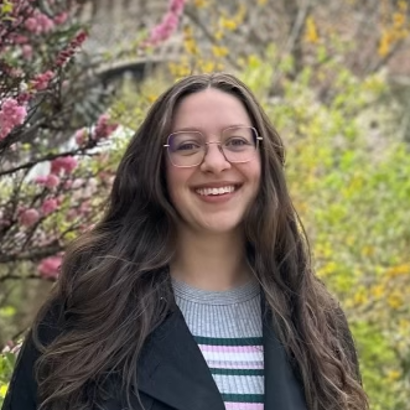
Author: Danica Schmidtke
When this article was published in 2024, Danica was a PhD student in Ami Bhatt’s and Gavin Sherlock’s labs at Stanford University, interested in studying viruses that infect bacteria in the human gut and how they shape human health. Danica wrote this article while participating in the Stanford at the Tech program.
 Skip Navigation
Skip Navigation
